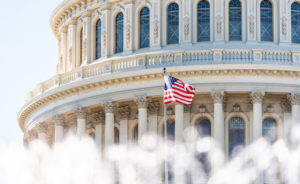
FTC announces a $5 billion fine against Facebook, USDA proposes a rule to end automatic SNAP eligibility, and more…
IN THE NEWS
- The Federal Trade Commission (FTC) announced a record $5 billion fine against Facebook for allegedly misleading users about the company’s privacy practices in violation of its 2012 consent agreement with the Commission. Facebook also agreed to new restrictions on its business operations, including requirements that the company submit to a third-party privacy auditor and establish an independent committee to oversee privacy-related decisions. “This settlement’s historic penalty and compliance terms will benefit American consumers, and the Department expects Facebook to treat its privacy obligations with the utmost seriousness,” Assistant Attorney General for the Civil Division of the Justice Department Jody Hunt said. In a dissenting statement, Commissioner Rohit Chopra argued that the agreement “does little to change the business model or practices that led to the recidivism” and said that “the grant of immunity for Facebook’s officers and directors is a giveaway.”
- The U.S. Department of Agriculture (USDA) proposed a rule to end automatic Supplemental Nutrition Assistance Program (SNAP) eligibility for low-income households already receiving other supplemental benefits. The rule would require over 3 million SNAP recipients to meet independent financial eligibility standards. USDA Secretary Sonny Perdue stated that the rule would close a loophole that “has been used to effectively bypass important eligibility guidelines,” leading to “misuse” of SNAP benefits. Senate Committee on Agriculture, Nutrition, and Forestry Ranking Member Debbie Stabenow (D-Mich.) called the rule “harmful,” saying that it “would take food away from families, prevent children from getting school meals, and make it harder for states to administer food assistance.”
- Former U.S. Department of Justice (DOJ) Special Counsel Robert Mueller testified before the House Committee on the Judiciary and the House Permanent Select Committee on Intelligence about his investigation into Russian interference in the 2016 presidential election. As anticipated, Mueller’s testimony carefully adhered to the contents of his April report to the DOJ. Mueller testified that President Donald J. Trump was not in fact exonerated of alleged obstruction of justice and that a President could be indicted for obstruction after leaving office.
- The DOJ announced that its Antitrust Division will investigate large tech companies, although the Justice Department did not specify which companies. Assistant Attorney General Makan Delrahim of the Antitrust Division stated, “Without the discipline of meaningful market-based competition, digital platforms may act in ways that are not responsive to consumer demands.” Senator Elizabeth Warren (D-Mass.) supported the measure, emphasizing that “big tech companies like Amazon, Facebook, and Google wield enormous, monopolistic power.”
- The Trump Administration expanded the authority of the U.S. Department of Homeland Security (DHS) to apply so-called expedited removal proceedings to any undocumented migrant who has been in the country for less than two years. Expedited removal—a fast-track deportation procedure that lacks many of the due process protections normally afforded to migrants—previously could only be applied to migrants who had arrived by sea or who were apprehended within 100 miles of an international land border. Omar Jadwat, director of the Immigrants’ Rights Project of the American Civil Liberties Union, said that the new policy provides “less due process than people get in traffic court” and promised to file suit quickly to challenge DHS’s new rule.
- President Trump announced his intention to nominate Eugene Scalia, the son of the late U.S. Supreme Court Justice Antonin Scalia, as Secretary of the U.S. Department of Labor. “Gene has led a life of great success in the legal and labor field and is highly respected not only as a lawyer, but as a lawyer with great experience working with labor and everyone else,” Trump wrote. Heidi Sheiholtz, senior economist and director of policy at the Economic Policy Institute, stated that “Eugene Scalia has spent his career fighting for the interests of financial firms, corporate executives, and shareholders rather than the interests of working people” and called the President’s nomination “another fox-guarding-the-hen house selection.”
- Congress and the Trump Administration reached a two-year budget agreement following lengthy negotiations led by U.S. Secretary of the Treasury Steven Mnuchin and House Speaker Nancy Pelosi (D-Calif.). The deal represents a compromise for both parties, reportedly including an increase in defense spending to $738 billion for fiscal year 2020 and $740 billion for fiscal year 2021, as well as increased funding for domestic programs such as the 2020 Census, the National Institutes of Health, and the Child Care and Development Fund. The agreement also suspends the debt ceiling for the next two years. Maya MacGuineas, president of think tank Committee for a Responsible Federal Budget, opined that the deal “may end up being the worst budget agreement in our nation’s history” for its failure to cap spending and to freeze the debt ceiling.
- New York Attorney General Letitia James reached a settlement with consumer credit reporting company Equifax that will require the company to pay $650 million, representing the largest civil penalty ever from a data breach. She criticized Equifax for putting “profits over privacy and greed over people.” The payment will be dispersed to those affected by the data breach and, as part of the settlement, Equifax must provide free services for the next 10 years to those who had their data breached.
- The Council on Environmental Quality (CEQ) extended the comment period on its proposed guidance on how an environmental assessment under the National Environmental Policy Act (NEPA) should address greenhouse gas emissions. The proposed guidance stated that NEPA analyses should not give greater consideration to potential effects from greenhouse gas emissions than to other potential effects on the environment. CEQ will accept public comments on or before August 26, 2019.
- The U.S. District Court for the Middle District of North Carolina approved a consent agreement barring North Carolina state officials from using existing state laws to “prevent transgender people from lawfully using public facilities in accordance with their gender identity.” The agreement stated that any attempt to apply the laws in such a manner would raise “serious federal-law concerns, including concerns over constitutional guarantees of equal protection and due process, as well as other applicable federal statutes.” Irena Como, acting legal director of the American Civil Liberties Union of North Carolina, said she was “thrilled to obtain some clarity and relief for transgender North Carolinians” but emphasized that “LGBTQ North Carolinians still lack comprehensive, statewide nondiscrimination protections while on the job, patronizing a business open to the public, or simply going about their daily lives.”
WHAT WE’RE READING THIS WEEK
- “Medicare for All” is at the forefront of an emerging democratic movement for more accessible and affordable health care, according to an article on the Law and Political Economy Blog by Allison Hoffman of the University of Pennsylvania Law School. U.S. health care policy has traditionally assumed that a market-based approach to health care policy is more in line with consumer preferences because it allows consumers to choose the health care plans they want, according to Hoffman. In reality, Hoffman noted, Americans struggle to navigate the complex array of plan options available under the Affordable Care Act and frequently select health care plans that cost them more than necessary in the long run. In this context, Medicare for All offers “Americans a straightforward way to express what they want for their own health care,” which is “to get better when they are sick” and to not be bankrupted by their health care costs, according to Hoffman.
- In a recently released working paper, Michelle Mello of Stanford Law School and Rebecca Wolitz of Yale Law School discuss how regulations that specifically target high drug prices risk being “void for vagueness” under the Due Process Clause. Mello and Wolitz provide examples from federal and state laws to illustrate vague phrases in legislation such as “unconscionable” or “price-gouging.” To overcome a due process legal challenge, they suggest grounding the language in specific definitions—including specific methods for determining when a drug is priced too high—to avoid violating pharmaceutical companies’ due process rights.
- In a new article in American University Washington College of Law’s Legislation and Policy Brief, Fernando Laguarda of American University explored the impact of presidential tweeting on federal policymaking. Laguarda argued that presidential tweeting is not simply storytelling, but an exercise of informal executive power that may direct federal agencies’ regulatory agendas. Given the potential power of the President’s tweets to “frame” agency decision-making, presidential use of social media must be better understood by scholars examining the exercise of administrative power, Laguarda concluded.



